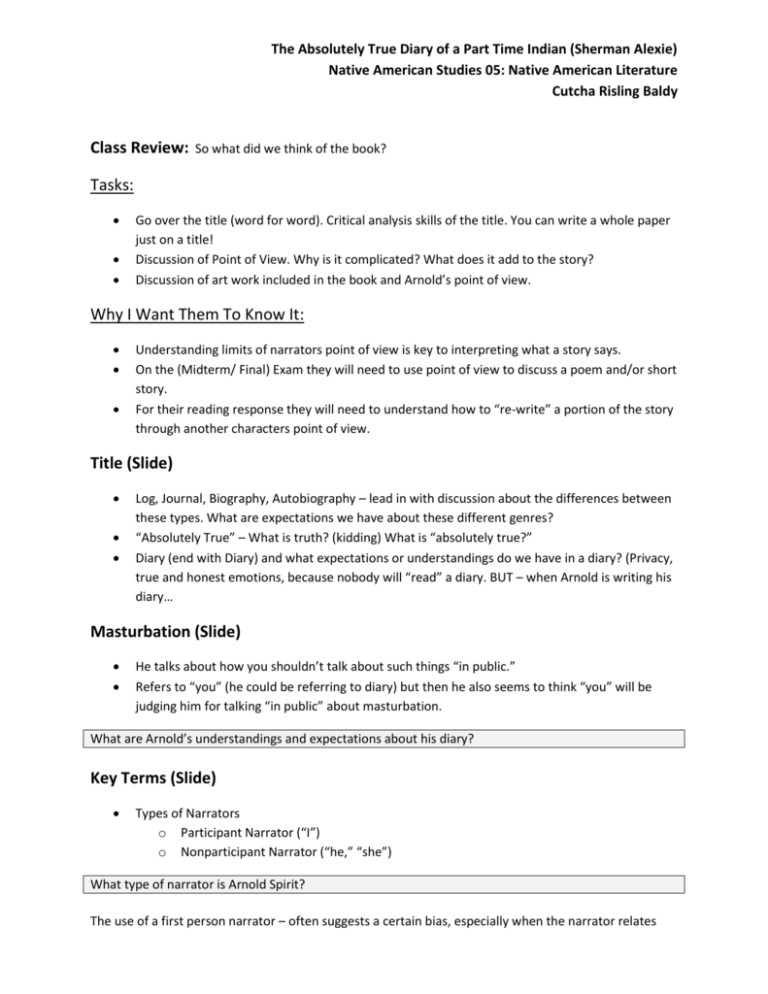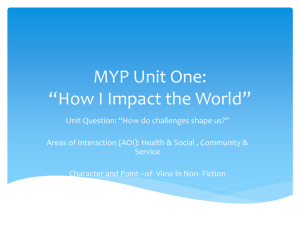Lesson Plan Example - NAS 05
advertisement

The Absolutely True Diary of a Part Time Indian (Sherman Alexie) Native American Studies 05: Native American Literature Cutcha Risling Baldy Class Review: So what did we think of the book? Tasks: Go over the title (word for word). Critical analysis skills of the title. You can write a whole paper just on a title! Discussion of Point of View. Why is it complicated? What does it add to the story? Discussion of art work included in the book and Arnold’s point of view. Why I Want Them To Know It: Understanding limits of narrators point of view is key to interpreting what a story says. On the (Midterm/ Final) Exam they will need to use point of view to discuss a poem and/or short story. For their reading response they will need to understand how to “re-write” a portion of the story through another characters point of view. Title (Slide) Log, Journal, Biography, Autobiography – lead in with discussion about the differences between these types. What are expectations we have about these different genres? “Absolutely True” – What is truth? (kidding) What is “absolutely true?” Diary (end with Diary) and what expectations or understandings do we have in a diary? (Privacy, true and honest emotions, because nobody will “read” a diary. BUT – when Arnold is writing his diary… Masturbation (Slide) He talks about how you shouldn’t talk about such things “in public.” Refers to “you” (he could be referring to diary) but then he also seems to think “you” will be judging him for talking “in public” about masturbation. What are Arnold’s understandings and expectations about his diary? Key Terms (Slide) Types of Narrators o Participant Narrator (“I”) o Nonparticipant Narrator (“he,” “she”) What type of narrator is Arnold Spirit? The use of a first person narrator – often suggests a certain bias, especially when the narrator relates events in which he or she has played a part. In such cases the narrator sometimes has an obvious interest in audience accepting his or her version of the story. Reliable vs. Unreliable Narrator o Innocent or naïve narrator – age (but not necessarily). We understand something they might not understand. o Unreliable narrator – sometimes people lie. Sometimes people have motivations to change the story. Or sometimes people are crazy. Now we will take two positions (get into work groups and split the class): I think Arnold is a reliable narrator. I think Arnold is an unreliable narrator. They will have three minutes to discuss their position. Discuss what they had in common. Consider who is telling the story Ask why the narrator is telling the story Think about whether anything important is being left out of the story So I Draw (Slide) Picture of Arnold’s Parents o The “best” version of his parents. He may want the audience to only see them this way. Picture of Mr. P o He doesn’t feel the same attachment to Mr. P so he can turn him in to a cartoon character. What role does Art and Drawing play in the book? Is this what Mr. P looks like? Is this what Arnold’s parents looks like? Key Terms (Slide) Character Protagonist/ Antagonist Who is the protagonist? Who is the antagonist? Complicate the discussion. Most students will say Rowdy. Could Arnold be his own antagonist? Author The author is Sherman Alexie – but is he the “writer?” Complicate the discussion of “terms” to understand this text. Writer Genre (Fiction/ Non-Fiction) o Memoir, Biography, Autobiography/ Novel Writing Assignment (in class): On page 5 Arnold draws a picture of what could be interpreted as the “worst” version of himself, or the things that he is the most self-conscious about. He also draws pictures of the best version of his parents. Think about yourself and draw a picture of what you think are the best and worst versions of yourself. You will use this as part of your reading response assignment.





